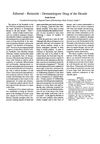 18 citations,
June 2019 in “Clinical research in dermatology”
18 citations,
June 2019 in “Clinical research in dermatology” Acne can't be cured but can be managed with treatments like benzoyl peroxide and diet changes; it's costly and can lead to scarring and mental health issues.
 77 citations,
July 2020 in “Journal of the European Academy of Dermatology and Venereology”
77 citations,
July 2020 in “Journal of the European Academy of Dermatology and Venereology” Environmental factors, hormones, nutrition, and stress all significantly affect skin health and aging.
 70 citations,
February 2012 in “Human Reproduction”
70 citations,
February 2012 in “Human Reproduction” Many young women who donate blood have hormonal disorders like excess male hormones and PCOS.
 7 citations,
September 2013 in “Current Dermatology Reports”
7 citations,
September 2013 in “Current Dermatology Reports” Some skin medications are safe for pregnant women, but others pose risks or should not be used.

Accurate diagnosis and timely, tailored treatments improve outcomes in obstetrics and gynecology.
102 citations,
July 2020 in “International journal of molecular sciences” Hormones like testosterone and estrogen significantly affect hair growth and structure.
 16 citations,
May 2019 in “Hormone and Metabolic Research”
16 citations,
May 2019 in “Hormone and Metabolic Research” Selenium might help with insulin resistance and cholesterol in PCOS, but more research is needed to confirm its benefits.
 31 citations,
September 2006 in “The Journal of Clinical Endocrinology & Metabolism”
31 citations,
September 2006 in “The Journal of Clinical Endocrinology & Metabolism” Testosterone therapy may slightly improve sexual function in postmenopausal women, but its long-term safety is unknown.
28 citations,
January 1986 in “International Journal of Dermatology” A pregnant woman developed a rash caused by a yeast infection, not acne.
 February 2023 in “Pakistan Journal of Medical and Health Sciences”
February 2023 in “Pakistan Journal of Medical and Health Sciences” Pregnancy can cause various skin changes, with stretch marks, dark lines on the abdomen, and skin darkening being the most common.
 34 citations,
June 2014 in “The BMJ”
34 citations,
June 2014 in “The BMJ” Pregnancy can change skin disease severity, with some conditions improving and others worsening, and treatment should balance benefits and fetal safety.
 January 2019 in “Obstetrics & Gynecology International Journal”
January 2019 in “Obstetrics & Gynecology International Journal” Hormonal changes and conditions like polycystic ovarian syndrome are major causes of adult acne in women, with varying prevalence among different ethnicities.
January 2015 in “Chinese Journal of New Clinical Medicine” Metformin combined with dyne-35 increases ovulation and pregnancy rates in PCOS patients.
 December 2023 in “International journal of research in dermatology”
December 2023 in “International journal of research in dermatology” Most pregnant women experience common skin changes like linea nigra and stretch marks.
September 2018 in “Obsgyne Review Journal of Obstetric and Gynecology of Siddharth Health Research and Social Welfare Society” Pregnant women often experience a variety of skin problems, including pigmentation changes and stretch marks.
 January 2016 in “Kafkas Journal of Medical Sciences”
January 2016 in “Kafkas Journal of Medical Sciences” Turkish pregnant women commonly experienced skin issues like itching and acne, and doctors mainly used topical treatments due to safety concerns during pregnancy.
 13 citations,
December 2020 in “Dermatologic Therapy”
13 citations,
December 2020 in “Dermatologic Therapy” Sebaceous glands in our skin, developing during pregnancy and active in puberty, produce sebum for skin lubrication, temperature control, and fighting germs, also help in hormone regulation, and their dysfunction can cause conditions like acne and hair loss.
 4 citations,
January 2014 in “Dermatology”
4 citations,
January 2014 in “Dermatology” A woman with acne and baldness was found to have a rare ovarian condition but successfully had a child through fertility treatment.
17 citations,
January 2004 in “European journal of obstetrics, gynecology, and reproductive biology/European journal of obstetrics & gynecology and reproductive biology” Certain hormone medications can treat symptoms like acne and unwanted hair, regulate periods, and prevent pregnancy in women and teenage girls.
 8 citations,
May 1998 in “Journal of Oral and Maxillofacial Surgery”
8 citations,
May 1998 in “Journal of Oral and Maxillofacial Surgery” Acne is caused by increased sebum, abnormal skin shedding, bacteria, and inflammation, not dirt; treatments vary from creams to antibiotics or isotretinoin, with severe cases needing a dermatologist's care.
 12 citations,
May 2017 in “Medicine”
12 citations,
May 2017 in “Medicine” Oral isotretinoin was recommended for a 21-year-old woman with severe acne.
 January 2017 in “Clinical approaches and procedures in cosmetic dermatology”
January 2017 in “Clinical approaches and procedures in cosmetic dermatology” Retinoids are effective for skin conditions like severe acne and psoriasis but must be used with caution due to potential side effects and risks during pregnancy.
 July 2022 in “International journal of medical science and clinical invention”
July 2022 in “International journal of medical science and clinical invention” Women with irregular periods should be checked for PCOS and treated early to prevent complications, with birth control pills helping to manage symptoms.
 17 citations,
March 2006 in “Journal of Cosmetic Dermatology”
17 citations,
March 2006 in “Journal of Cosmetic Dermatology” Hormonal changes during and after pregnancy can cause hair growth changes and hair loss, with treatments available for some conditions.
 August 2023 in “International journal of reproduction, contraception, obstetrics and gynecology”
August 2023 in “International journal of reproduction, contraception, obstetrics and gynecology” Combining letrozole with metformin is the most effective treatment for inducing pregnancy in women with PCOS.
 March 2017 in “International Journal of Women's Dermatology”
March 2017 in “International Journal of Women's Dermatology” This special edition focuses on the unique aspects of treating skin conditions in women, including during pregnancy and in diverse populations like women of color and transgender patients.
 January 1990 in “Irish Journal of Medical Science (1971 -)”
January 1990 in “Irish Journal of Medical Science (1971 -)” Retinoids are important for treating skin conditions but should be used with caution due to serious side effects and risks during pregnancy.
 10 citations,
June 2006 in “Fertility and Sterility”
10 citations,
June 2006 in “Fertility and Sterility” The conclusion is that metformin is a first-line treatment for PCOS, particularly for restoring ovulation and increasing pregnancy rates, with other treatments depending on specific symptoms.
 July 2019 in “International journal of reproduction, contraception, obstetrics and gynecology”
July 2019 in “International journal of reproduction, contraception, obstetrics and gynecology” Obesity greatly affects polycystic ovarian syndrome, and losing weight should be the first treatment for obese patients to improve their chances of ovulation and pregnancy.
 97 citations,
November 1986 in “Journal of Steroid Biochemistry”
97 citations,
November 1986 in “Journal of Steroid Biochemistry” Antiandrogens affect androgen-dependent body functions and are used for various medical conditions, with some risks like fetus feminization, but new forms like 17α-propylmesterolone show promise for acne without systemic effects.

























